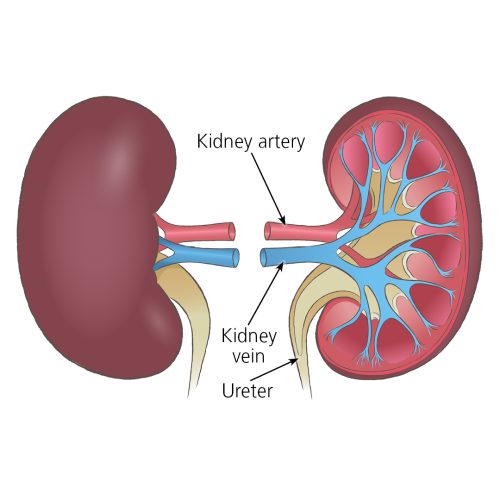Kidney transplant cost in Iran
Best Hospital
We Introduce Best Hospital for General Heart Surgery
Best Doctors
We Introduce Best Doctors for General Heart Surgery
Best Price
We Try to introduce best Services with Regular Price
How much does Kidney Transplant Cost in Iran?
Kidneys are vital organs that play an essential role in maintaining our overall health. They act as filters, removing waste and excess fluids from the body, regulating blood pressure, and producing red blood cells. Without functioning kidneys, the accumulation of toxins in the body can lead to serious health complications.
If an individual is diagnosed with kidney disease, one of the most common treatment options is dialysis or a kidney transplant. A kidney transplant is a surgical procedure that replaces a patient’s damaged kidney with a healthy kidney from a donor. This procedure has helped many patients regain their health and quality of life.
If you are considering a kidney transplant in Iran, understanding the costs associated with the procedure is crucial. Fortunately, kidney transplant surgery in Iran is considerably less expensive than in many other countries. This surgery can take several hours, and patients are typically hospitalized for a few days to monitor their recovery. It is important to note that the success of the transplant depends on various factors, such as the patient’s overall health and the compatibility of the donor’s kidney.
If you are considering a kidney transplant in Iran, it is essential to consult with a healthcare provider or medical tourism agency to understand the cost and available options. With proper care and monitoring, a successful kidney transplant can help patients lead a healthy and fulfilling life

What is a kidney transplant?
A kidney transplant is a surgical procedure that involves the replacement of a patient’s damaged or non-functioning kidney with a healthy kidney from a donor. The donor kidney can come from a living donor, such as a family member or friend, or a deceased donor whose kidney has been donated for transplantation.
During the kidney transplant surgery, the patient’s damaged kidney is removed, and the healthy donor kidney is transplanted into the patient’s body. The new kidney is typically placed in the lower abdomen, and the blood vessels of the new kidney are connected to the patient’s blood vessels. The ureter, which is the tube that carries urine from the kidney to the bladder, is connected to the patient’s bladder.
After the transplant surgery, patients are typically hospitalized for a few days to monitor their recovery. They will also need to take medications to prevent rejection of the new kidney by the body’s immune system. The success of a kidney transplant depends on various factors, including the patient’s overall health, the compatibility of the donor kidney, and the patient’s adherence to the post-transplant medication regimen.
A successful kidney transplant can significantly improve the quality of life for patients with kidney disease, allowing them to lead a more normal and active life

Diseases related to heart surgery

Kidney rejection
This disease causes the rejection of the transplanted kidney, in which the graft cells are recognized as invaders in the body's immune system and destroyed.

Infection
Bacterial and viral infections can occur in patients after kidney transplantation, which can lead to kidney rejection, fever, and general discomfort.

Diabetes
Patients who had diabetes before kidney transplantation may also face problems related to diabetes after kidney transplantation.

Atherosclerosis
This disease usually occurs in patients after kidney transplantation due to increased blood lipid levels and high blood pressure. This disease can cause cardiac and vascular disorders.
Who needs a kidney transplant?
Patients who have reached stage 5 of chronic kidney disease or end-stage renal disease (ESRD) often require a kidney transplant or dialysis. In some cases, patients at stage 4 may also be candidates for a kidney transplant.
Before undergoing a kidney transplant, it is important to undergo a thorough medical evaluation to determine if the procedure is appropriate for your overall health condition. Additionally, it is crucial to follow a healthy lifestyle and adhere to the prescribed medication regimen post-transplant to ensure the longevity and health of the new kidney

Before kidney transplant
Before undergoing a kidney transplant, it is necessary to take several steps to ensure the surgery is successful and the risk of organ rejection is minimized.
1-Finding a donor: Kidney donors can be living or deceased and may be family members, friends, or unrelated individuals. Doctors perform various tests to identify the best match and reduce the risk of kidney rejection.
2-Blood type matching: Finding a donor with the same blood type or a compatible one is ideal. However, transplants with incompatible blood types are also possible but require additional treatments before and after the surgery. This type of transplant is known as an ABO-incompatible kidney transplant.
3-Tissue evaluation: After the blood type match is determined, a tissue evaluation is necessary. Doctors use a test called human leukocyte antigen (HLA) typing to evaluate genetic markers that can increase the chances of the transplanted kidney lasting for a longer time. When there is a good match, the risk of kidney rejection is lower.
4-Cross-matching: In this test, a small sample of the recipient’s blood is combined with the donor’s blood in the laboratory to determine whether the recipient’s blood antibodies react against the antigens inside the donor’s blood or not. If the cross-match results are negative, it means the donor’s blood is compatible with the recipient’s blood, and the risk of kidney rejection is lower. However, if the cross-match results are positive, additional medical treatments before and after transplantation are necessary.
5-Checking other factors: Before the transplant, healthcare providers may also perform additional medical checkups to identify possible infections, age and size matching of the donor and recipient, and other factors that can affect the success of the transplant.
Taking these steps can help ensure a successful kidney transplant and improve the chances of a healthy and fulfilling life for the recipient
Why Iran for Kidney Transplant?
The first kidney transplant in the United States was performed in 1954. Since then, kidney transplant surgery has become a well-established procedure worldwide. Iran has emerged as a leading destination for kidney transplant surgery not only in the Middle East but also globally. There are several reasons why Iran is considered the best destination for kidney transplant surgeries:
- Highly Qualified Medical Teams: Iran has a team of highly qualified and experienced physicians who specialize in kidney transplant surgery, with a success rate of over 95%. Iranian medical teams have developed a reputation as being among the best in the world.
- Short Waiting Time: With the help of living donors, Iran has the shortest waiting list for kidney transplant surgery. Patients do not have to wait for a long time to find a donor, which is often a significant challenge in other countries.
- Affordable Costs: The cost of kidney transplant surgery in Iran is significantly lower than in many other countries, making it more accessible to patients from all over the world.
- Eligibility Criteria: Patients in Iran, regardless of their age, can undergo kidney transplant surgery as long as they are in good health condition and have a matched donor.
- Focus on Altruistic Donation: Iran has a unique system of organ donation and transplantation based on altruistic donation, which has been successful in increasing the number of organ donors in the country.
Overall, Iran’s highly qualified medical teams, short waiting times, affordable costs, and unique system of organ donation and transplantation make it an attractive destination for patients seeking kidney transplant surgery.
The best surgeons for kidney transplant in Iran
Node Gesht Aram Medical Tourism Company has been able to provide the best services in this field by having the most expert and experienced surgeons and doctors for kidney transplant surgery in Iran.
Conclusion:
The cost of kidney transplant in Iran is generally lower compared to many other countries, making it an affordable option for patients seeking kidney transplant surgery. The exact cost of the procedure can vary depending on several factors, including the patient’s medical condition, the type of transplant, the hospital or medical facility where the surgery is performed, and the type of insurance coverage, if any. However, the cost of kidney transplant surgery in Iran is generally considered to be more affordable than in many other countries, which makes it an attractive option for patients seeking high-quality medical care at a reasonable cost. It is important to consult with a healthcare provider or medical tourism agency to get an accurate estimate of the cost of kidney transplant surgery in Iran and to understand the available options and payment methods.


Frequently asked questions about Kidney transplant :
Yes, insurance in Iran usually covers the cost of a kidney transplant. However, it is important to check your own insurance conditions and coverage.
Typically, the cost of a kidney transplant in Iran is reimbursed within 2 to 5 years, but this period may vary depending on different factors, especially the type of disease and the individual’s condition.
Yes, sometimes the cost of a kidney transplant in Iran may decrease depending on economic and political conditions. However, it should be noted that a decrease in cost should not come at the expense of the quality of medical services and the individual’s health.

